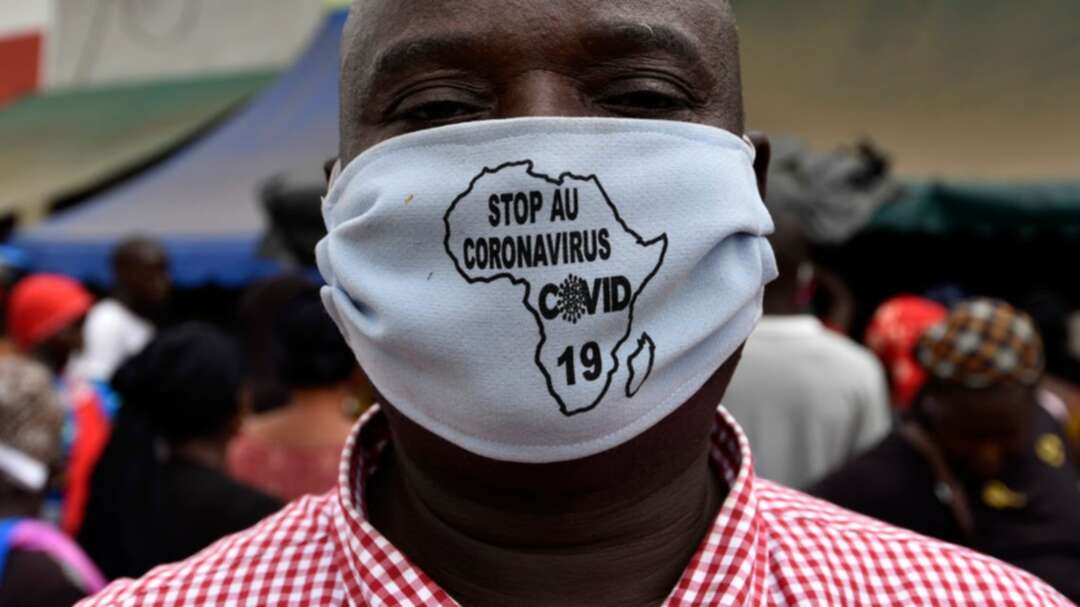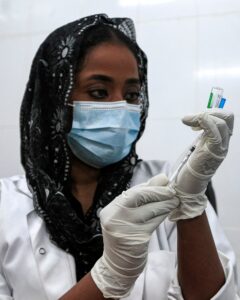-
Africa’s Red Cross chief in COVID-19 vaccine plea: ‘Don’t forget people off the grid'

A charity chief has urged for fair access to COVID-19 vaccines – making a plea to countries and vaccination providers to not forget “people off the grid” such as those in Africa; a continent already weakened by conflict and humanitarian disasters.
Patrick Youssef, the International Committee of the Red Cross (ICRC) Africa director, said about half the countries in the continent, with a population of more than one billion, has yet to receive any vaccine supplies, raising fears that a rise in coronavirus infections could quickly overwhelm already fragile health systems.Speaking to Al Arabiya English on the sidelines of the Dubai International Humanitarian Aid & Development Conference & Exhibition (DIHAD), Youssef said that as wealthy nations snapped up several billion vaccine doses it has meant some countries in the developing world have little or none.
“We are extremely concerned and extremely concerned about this,” said Youssef, pointing out that, to date, just 22 out of 54 African countries have received vaccine supplies.
“For example, 300,000 doses will reach Libya in the coming weeks, but in most countries - those that are receiving vaccines – supplies are very moderate.”
“Let’s be honest, it is about competition. There are only a few COVID-19 vaccine producers over the world – who are trying to vaccinate the world. And Africa has not been a priority.”
While Africa is a continent “well used to dealing with viruses and atrocities”, Youssef said they need help from overseas.
“When we look at US or Europe they are caring for own citizens – we understand why its complex to prioritize others – but there’s a moral imperative to help countries who do not have the same capabilities – especially in continents experiencing war and violence.”
“These are people off the grid – away from people’s eyes and conscience – and it means they are the victim of loss of attention.”
While many African countries have received praise for waging an effective campaign to combat the spread of coronavirus – the risk facing the continent could cripple communities and countries, unless richer nations step in to help.
 A medical worker prepares a dose of the Oxford-AstraZeneca COVID-19 coronavirus vaccine at the Jabra Hospital for Emergency and Injuries in Sudan's capital Khartoum on March 9, 2021. (File photo: AFP)
A medical worker prepares a dose of the Oxford-AstraZeneca COVID-19 coronavirus vaccine at the Jabra Hospital for Emergency and Injuries in Sudan's capital Khartoum on March 9, 2021. (File photo: AFP)Despite its vast size, the continent has had fewer cases than those in either Europe, Asia or the Americas, but cases are on the rise.
As of March 15, confirmed cases of COVID-19 from 55 African countries reached 4,036,012 – accounting for just 3.4 per cent of global infections. Reported deaths in Africa reached 107,821, 3,622,399 people have recovered, with over 5,161,375 vaccinations administered, according to the Africa Centers for Disease Control and Prevention (Africa CDC).
“We need to acknowledge that Africa as a whole has managed, in the wake of the coronavirus with the tools and the capacities it had to contain the threat as much as possible, since first case on the continent was confirmed in Egypt on February 14 last year,” said Youssef.
Right from the beginning, he said, most African governments took drastic measures to try to slow the spread of the virus. Public health measures - including avoiding handshakes, frequent hand-washing, social distancing and wearing of face masks - were swiftly introduced – while many countries went into early lockdown.
However, measures implemented have varied from richer nations – such as Egypt and Morocco – to poorer nations, already coping with humanitarian and conflict threats – such as Sudan and Kenya, struggling from a lack of infrastructure to educate and treat citizens, and a “total lack of Personal Protective Equipment (PPE)”, said Youssef.
Help for poorer nations
As the Africa moves into its second year of coping with the pandemic, outside help is needed more than ever.
“As we move past the 12-month mark after the initial outbreak in the continent we need to continue raising awareness of the humanitarian impact of COVID-19,” said Youssef.
“In Africa the virus and new variants are accelerating across the continent in areas already wakened by conflict.
“The same motto applies – no one is safe from COVID-19 – and Africa is a huge space that not only offers external commerce but is home to millions of migrants.”
“When we talk about vaccine equity it is about fairness in distribution and there is a need for all states in the continent to benefit from the UN-backed COVAX effort to get vaccines to the world’s most vulnerable people – and to benefit from ties with China, Russia, India and other counties who are producers of vaccines.”
“Vaccines for all is the only way to salvage humanity as a whole.”
 CEPI, GAVI, and WHO have launched COVAX to ensure equitable access to COVID-19 vaccines and end the acute phase of the pandemic by the end of 2021. (Twitter/@CEPI vaccines)
CEPI, GAVI, and WHO have launched COVAX to ensure equitable access to COVID-19 vaccines and end the acute phase of the pandemic by the end of 2021. (Twitter/@CEPI vaccines)The ICRC works to support organizations on the frontline of preventative measures and health systems with PCR testing programs.
Countries such as Ethiopia, home to more than two million displaced people, can present extreme logistical challenges.
Another key role is education.
In many places across Africa, such as a vast number of refugee camps in countries like Sudan, where millions of people live in tents and share meals and water, it is impossible to enforce social distancing measures, said Youssef.
The ICRC works to educate them about the importance of hygiene to reduce virus transmission risk.The charity also works as a safe intermediary with armed groups controlling large parts of land across the continent to create a safe platform for populations to receive healthcare.
“It is important for the international community not to see Africa as a charity case – but a place where people need the basics – access to vaccines and access to information,” said Youssef.
“It is much more than a must. It’s a humanitarian necessity.”
source: Jennifer Bell
Image source: AFP
Levant
You May Also Like
Popular Posts
Caricature
BENEFIT Sponsors BuildHer...
- April 23, 2025
BENEFIT, the Kingdom’s innovator and leading company in Fintech and electronic financial transactions service, has sponsored the BuildHer CityHack 2025 Hackathon, a two-day event spearheaded by the College of Engineering and Technology at the Royal University for Women (RUW).
Aimed at secondary school students, the event brought together a distinguished group of academic professionals and technology experts to mentor and inspire young participants.
More than 100 high school students from across the Kingdom of Bahrain took part in the hackathon, which featured an intensive programme of training workshops and hands-on sessions. These activities were tailored to enhance participants’ critical thinking, collaborative problem-solving, and team-building capabilities, while also encouraging the development of practical and sustainable solutions to contemporary challenges using modern technological tools.
BENEFIT’s Chief Executive Mr. Abdulwahed AlJanahi, commented: “Our support for this educational hackathon reflects our long-term strategic vision to nurture the talents of emerging national youth and empower the next generation of accomplished female leaders in technology. By fostering creativity and innovation, we aim to contribute meaningfully to Bahrain’s comprehensive development goals and align with the aspirations outlined in the Kingdom’s Vision 2030—an ambition in which BENEFIT plays a central role.”
Professor Riyadh Yousif Hamzah, President of the Royal University for Women, commented: “This initiative reflects our commitment to advancing women in STEM fields. We're cultivating a generation of creative, solution-driven female leaders who will drive national development. Our partnership with BENEFIT exemplifies the powerful synergy between academia and private sector in supporting educational innovation.”
Hanan Abdulla Hasan, Senior Manager, PR & Communication at BENEFIT, said: “We are honoured to collaborate with RUW in supporting this remarkable technology-focused event. It highlights our commitment to social responsibility, and our ongoing efforts to enhance the digital and innovation capabilities of young Bahraini women and foster their ability to harness technological tools in the service of a smarter, more sustainable future.”
For his part, Dr. Humam ElAgha, Acting Dean of the College of Engineering and Technology at the University, said: “BuildHer CityHack 2025 embodies our hands-on approach to education. By tackling real-world problems through creative thinking and sustainable solutions, we're preparing women to thrive in the knowledge economy – a cornerstone of the University's vision.”
opinion
Report
ads
Newsletter
Subscribe to our mailing list to get the new updates!






















